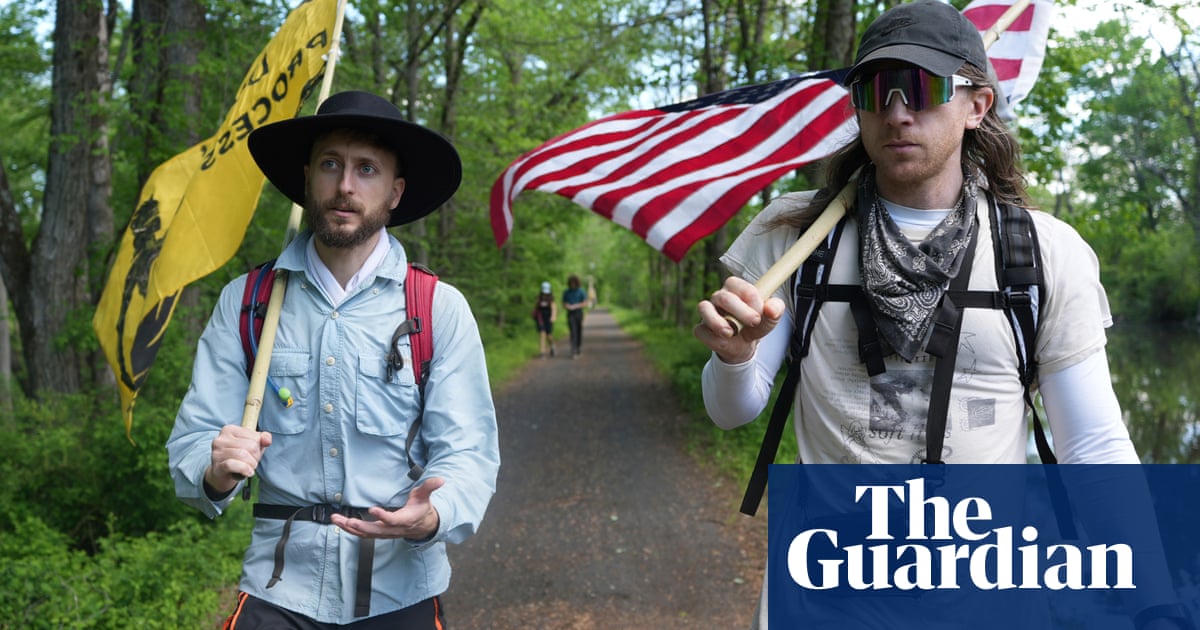A group of Quakers were marching more than 300 miles from New York City to Washington DC to demonstrate against theTrump administration’s crackdown on immigrants.
The march extends a long tradition of Quaker activism. Historically,Quakershave been involved in peaceful protests to end wars and slavery, and support women’s voting rights in line with their commitment to justice and peace. Far more recently, Quakers sued the federal government earlier this year over immigration agents’ ability to make arrests at houses of worship.
Organizers of the march say their protest seeks to show solidarity with migrants and other groups that are being targeted by Donald Trump’s second presidency.
“It feels really daunting to be up against such critical and large and in some ways existential threats,” said Jess Hobbs Pifer, a 25-year-old Quaker and march organizer, who said she felt “a connection” to the faith’s long history of activism.
“I just have to put one foot in front of the other to move towards something better, something more true to what Quakers before us saw for this country and what people saw for the American Experiment, the American dream,” she said.
Their goal was to walk south from the Flushing Quaker Meeting House – across New York, New Jersey, Maryland and Pennsylvania – to the US Capitol to deliver a copy of the Flushing Remonstrance, a 17th-century document that called for religious freedom and opposed a ban on Quaker worship.
Quakers say it remains relevant in 2025 as a reminder to “uphold the guiding principle that all are welcome”.
“We really saw a common thread between the ways that the administration is sort of flying against the norms and ideals of constitutional law and equality before the law,” said Max Goodman, 28, a Quaker, who joined the march.
“Even when they aren’t breaking rules explicitly, they’re really engaging in bad faith with the spirit of pluralism, tolerance and respect for human dignity that undergirds our founding documents as Americans and also shows up in this document that’s really important in New York Quaker history.”
The Quakers, whose formal name is the Religious Society of Friends, originated in 17th century England.
The Christian group was founded by George Fox, an Englishman who objected to Anglican emphasis on ceremony. In the 1640s, he said he heard a voice that led him to develop a personal relationship with Christ, described as the Inner Light.
Fox taught that the Inner Light emancipates a person from adherence to any creed, ecclesiastical authority or ritual forms.
Brought to court for opposing the established church, Fox tangled with a judge who derided him as a “quaker” in reference to his agitation over religious matters.
Following the faith’s core beliefs in nonviolence and justice, Quakers have demonstrated for the abolition of slavery, in favor of the suffrage movement, against both world wars, and the US role in the wars in Vietnam and Afghanistan, said Ross Brubeck, 38, one of the Quaker march organizers.
They also joined protests against the World Trade Organization in Seattle and the Black Lives Matter protests after the 2020 killing ofGeorge Floyd.
“Quakers have had a central role in opposition to repression within the United States since its founding,” said Brubeck, who was marching along a trail in New Jersey with companions waving an upside-down American flag, intended to serve as a signal of distress.
One the most well-known Quakers was William Penn, who founded Pennsylvania following the faith’s emphasis on religious tolerance. The group became influential in cities like Philadelphia.
But members of the group have also faced scorn for refusing to join wars due to their belief in pacifism and nonviolence. Some were persecuted and even killed for trying to spread their religious beliefs.
Earlier this year, five Quaker congregations filed a lawsuit challenging a Trump administration move giving immigration agentsmore leeway to make arrests at houses of worship.
Trump has insisted that immigrants are an existential threat to America.Immigration into the US, both legal and illegal, surged during Joe Biden’s presidency, and Trump assailed that influx before winning November’s election.
Since returning to the White House in January, Trump has launched a campaign of immigration enforcement that has pushed the limits of executive power and clashed with federal judges trying to restrain him.
“Immigrants are the ones experiencing the most acute persecution in the United States,” Brubeck said. “The message to Trump is that the power is not his to make.”
